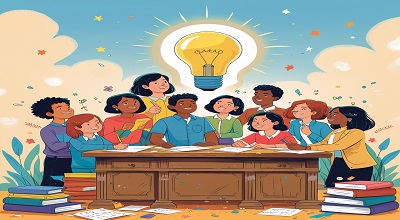Personal Growth Through Education
Personal Growth Through Education: Education is a powerful tool that goes beyond acquiring knowledge—it shapes personalities, builds character, and fosters personal growth. Whether through formal schooling, online courses, or self-directed learning, education plays a crucial role in helping individuals evolve intellectually, emotionally, and socially.
Understanding Personal Growth Through Education
Personal growth refers to the continuous development of skills, knowledge, and emotional well-being. Education serves as a catalyst for this growth by:
- Expanding intellectual capabilities
- Encouraging self-reflection and awareness
- Promoting adaptability and resilience
- Fostering social and emotional intelligence
When individuals engage in learning, they challenge their perspectives, acquire new skills, and become better equipped to navigate life’s challenges.
The Role of Formal Education in Personal Development
Formal education (schools, colleges, universities) provides structured learning environments that contribute to personal growth by:
- Building Foundational Knowledge: Core subjects like math, science, and literature develop cognitive abilities.
- Encouraging Discipline and Time Management: Meeting deadlines and following schedules instill responsibility.
- Promoting Social Interaction: Group projects and extracurricular activities enhance teamwork and communication.
However, formal education is just one part of the learning journey—informal and experiential learning also play significant roles.
Informal Education and Lifelong Learning
Informal education includes self-study, online courses, workshops, and real-world experiences. Lifelong learning ensures continuous personal growth by:
- Encouraging Curiosity: Self-motivated learners explore new topics beyond traditional curricula.
- Adapting to Change: In a fast-evolving world, upskilling keeps individuals competitive.
- Enhancing Practical Skills: Hands-on experiences (internships, volunteering) build real-world competence.
Platforms like Coursera, Udemy, and Khan Academy make informal learning accessible to everyone.
Examples of Personal Growth Through Education
Example 1: Academic Achievement and Career Success
Many successful professionals attribute their growth to education. For instance, Oprah Winfrey overcame poverty through education, eventually becoming a media mogul.
Example 2: Developing Critical Thinking and Problem-Solving Skills
Students who engage in debate clubs or STEM programs learn to analyze situations and develop innovative solutions.
Example 3: Enhancing Emotional Intelligence and Social Skills
Education fosters empathy and communication—key traits for leadership. Programs like SEL (Social-Emotional Learning) in schools help students manage emotions effectively.
Example 4: Building Confidence and Self-Esteem
Completing a degree or mastering a skill boosts self-worth. Malala Yousafzai’s advocacy for girls’ education highlights how learning empowers individuals.
Example 5: Cultivating Creativity and Innovation
Art, music, and design education nurture creativity. Steve Jobs credited a calligraphy class for inspiring Apple’s typography.
The Impact of Technology on Educational Growth
Technology revolutionizes learning through:
- E-Learning Platforms: Accessible education for remote learners.
- AI and Personalized Learning: Adaptive software tailors lessons to individual needs.
- Virtual Reality (VR): Immersive experiences enhance understanding.
However, digital literacy is essential to maximize these tools.
Challenges in Achieving Personal Growth Through Education
Despite its benefits, education faces obstacles:
- Financial Barriers: High tuition costs limit access.
- Mental Health Struggles: Academic pressure affects well-being.
- Unequal Opportunities: Socioeconomic disparities hinder learning.
Addressing these issues ensures inclusive growth.
Strategies to Maximize Personal Growth in Education
- Set Clear Goals: Define what you want to achieve.
- Engage in Active Learning: Participate in discussions and practical applications.
- Seek Mentorship: Learn from experienced individuals.
- Embrace Failure: Mistakes are growth opportunities.
- Stay Updated: Follow the latest educational trends.
Conclusion
Education is a lifelong journey that fuels personal growth. Whether through formal or informal learning, individuals gain skills, confidence, and resilience. By leveraging technology, overcoming challenges, and adopting effective strategies, anyone can harness education’s transformative power.
FAQs
Q1: How does education contribute to personal growth?
Education enhances knowledge, critical thinking, emotional intelligence, and career opportunities, fostering overall development.
Q2: Can informal education be as effective as formal education?
Yes, informal education (online courses, workshops) provides flexible and practical learning experiences.
Q3: What are some examples of personal growth through education?
Examples include career success (Oprah Winfrey), innovation (Steve Jobs), and social impact (Malala Yousafzai).
Q4: How can technology improve educational growth?
E-learning platforms, AI, and VR make education more accessible, personalized, and engaging.
Q5: What challenges do people face in achieving growth through education?
Financial constraints, mental health issues, and unequal access to resources are common barriers.
Free Download: Food Land APK
